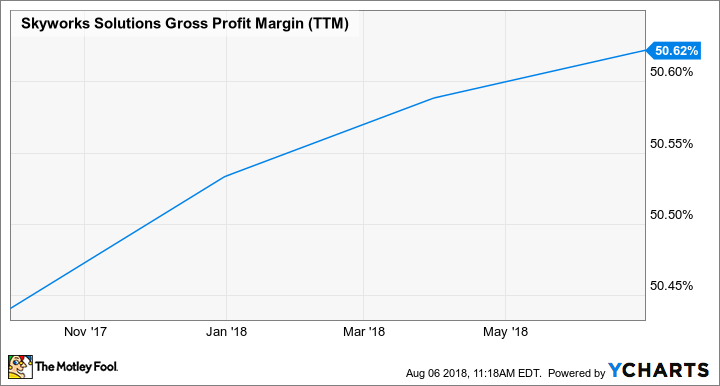2 Ways Skyworks Solutions Is Trying to Beat the Smartphone Slowdown
Skyworks Solutions' (NASDAQ: SWKS) latest quarterly report clearly indicates that its days of high growth are over. Best known for supplying radio frequency chips to Apple, the chipmaker was having a ball when sales of the iPhone were soaring. But a saturating smartphone market has hamstrung the company's rapid growth over the past few quarters.
After a moderate sales decline last quarter, Skyworks anticipates $1 billion in revenue during the September-ended quarter, up just 1.5% from the prior-year period. By comparison, the company's revenue increased an impressive 18% year over year during the same period last year. So, Skyworks' dependence on the smartphone market for around 70% of its revenue isn't doing much to boost its results.
But investors are still upbeat about the company's prospects as it is pulling the right strings elsewhere to secure long-term growth.

Image Source: Getty Images.
The new catalyst
Skyworks' non-mobile business supplied nearly $270 million in revenue last quarter, accounting for just over 30% of total sales. By comparison, this segment was supplying 27% of its total revenue, or $243 million, in the year-ago period. So Skyworks is currently witnessing double-digit growth in the broad markets business, though it won't be surprising if it hits a higher gear.
Skyworks' broad markets business mainly consists of the fast-growing Internet of Things (IoT) vertical, where demand for the connectivity chips that the company sells is quite strong. The chipmaker's radio frequency front-end modules play a critical role in enabling communication between IoT devices by supporting multiple wireless protocols, boosting wireless signals, and improving power efficiency.
Not surprisingly, these chips are finding solid traction among various IoT applications, including smart cities, smart homes, and the automotive space. Philips, for instance, is using Skyworks' connectivity modules for powering streetlights, while Sierra Wireless is also tapping the chipmaker's solutions to make data cards for enabling machine-to-machine (M2M) connectivity.
These partnerships could turn out to be a big deal for Skyworks, as both Philips and Sierra are leaders in their fast-growing industries. According to TechSci Research, Philips dominates the global smart-lighting market that's growing in excess of 21% a year. Sierra, on the other hand, holds 33% of the global M2M market. Juniper Research estimates that global M2M connections will more than triple over the next five years, thanks to the growing proliferation of IoT devices.
But these aren't Skyworks' only catalysts. The company has also trained its sights on automotive and smart home, recording design wins with the likes of BMW, General Motors, and Nest. Clearly, Skyworks Solutions has now turned its attention toward markets that will help it overcome the smartphone slump, and in a profitable manner, as evident from its improving margin profile.
This is just the beginning
As already mentioned, Skyworks was getting around 27% of its total revenue from the broad markets segment a year ago as compared with 30% right now. This isn't a huge jump by any standards, but it has been enough to boost the company's margins despite the smartphone slowdown.

SWKS Gross Profit Margin (TTM) data by YCharts.
More important, the IoT market is still in its early phases of growth. The cellular IoT market that's key to Skyworks' growth should take off big time once 5G wireless technology is deployed. This is because 5G will be critical to the growth of IoT as it is much faster than the current 4G technology. For instance, downloading a high-definition movie using a 4G network takes minutes today, but 5G can do the download in seconds.
As such, IoT elements such as autonomous cars and other machine-to-machine connections could communicate with each other more efficiently. Skyworks is prepared to tap into this opportunity with the help of its Sky5 platform that contains a set of modules necessary to support the various spectrum bands needed to power the 5G network.
More important, the chipmaker's margins should get a nice boost once it starts selling more of its 5G solutions, as these chips should cost more. 5G uses extremely high spectrum bands with frequencies in the range of 30 GHz to 300 GHz. By comparison, 4G uses frequencies that are below 6 GHz, so the new wireless standard will require more antennas as well as front-end modules to integrate the new frequency bands and improve power efficiency at the same time.
As such, the complexity of the equipment to deploy 5G networks will lead to higher equipment costs and this should filter down to Skyworks' bottom line. This is possibly why analysts expect the company's earnings to grow closer to the mid-teens over the next five years, though it won't be surprising if it does better thanks to the IoT niches it is pursuing.
More From The Motley Fool
Harsh Chauhan has no position in any of the stocks mentioned. The Motley Fool owns shares of and recommends Apple, Sierra Wireless, and Skyworks Solutions. The Motley Fool has the following options: long January 2020 $150 calls on Apple and short January 2020 $155 calls on Apple. The Motley Fool recommends BMW. The Motley Fool has a disclosure policy.

 Yahoo Finance
Yahoo Finance 